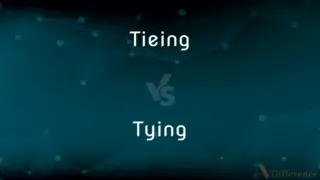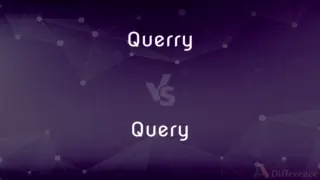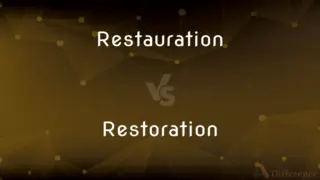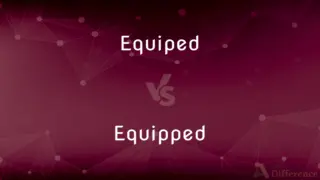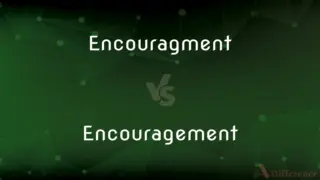Abble vs. Able — Which is Correct Spelling?
By Tayyaba Rehman — Updated on March 31, 2024
"Abble" is a misspelling. The correct spelling is "able," referring to the capability or suitability of someone or something.
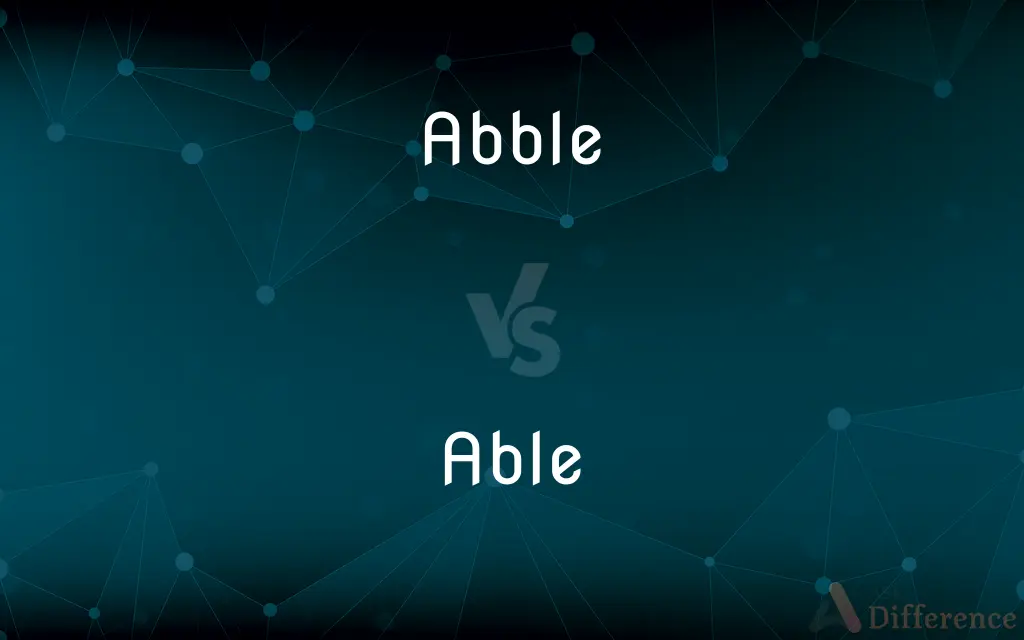
Table of Contents
Which is correct: Abble or Able
How to spell Able?

Abble
Incorrect Spelling

Able
Correct Spelling
ADVERTISEMENT
Key Differences
Think of "able" as indicating ability.
Recall the word "cable" which also ends with "able" and not "abble."
Remember, "able" is about being capable, and there's no extra "b" in "capable."
Associate "able" with the phrase "able-bodied."
Note the simplicity of "able" – short and direct, just like its meaning.
ADVERTISEMENT
How Do You Spell Able Correctly?
Incorrect: He was abble to complete the task in time.
Correct: He was able to complete the task in time.
Incorrect: I am abble to meet you tomorrow for lunch.
Correct: I am able to meet you tomorrow for lunch.
Incorrect: The team is abble to solve complex problems quickly.
Correct: The team is able to solve complex problems quickly.
Incorrect: They were not abble to attend the meeting.
Correct: They were not able to attend the meeting.
Incorrect: She is abble to speak three languages fluently.
Correct: She is able to speak three languages fluently.
Able Definitions
Having a considerable degree of aptitude or competence.
She's an able musician.
Having physical or mental power to achieve a particular action.
After the surgery, she was barely able to walk.
Having the power, skill, or resources to do something.
He is able to solve complex math problems.
Legally qualified or entitled to do something.
He's of able age to vote.
Having the necessary qualities to fulfill a particular role or task.
This software is able to detect malware on your device.
Having sufficient power or resources to accomplish something
A singer able to reach high notes.
A detergent able to remove stains.
Usage Problem Susceptible to action or treatment
The brakes were able to be fixed.
Especially capable or proficient
The new programmers proved to be very able.
Having the necessary powers or the needed resources to accomplish a task.
Free from constraints preventing completion of task; permitted to; not prevented from.
I’ll see you as soon as I’m able.
With that obstacle removed, I am now able to proceed with my plan.
I’m only able to visit you when I have other work here.
That cliff is able to be climbed.
Gifted with skill, intelligence, knowledge, or competence.
The chairman was also an able sailor.
(law) Legally qualified or competent.
He is able to practice law in six states.
(nautical) Capable of performing all the requisite duties; as an able seaman.
Having the physical strength; robust; healthy.
After the past week of forced marches, only half the men are fully able.
(obsolete) Easy to use.
(obsolete) Suitable; competent.
Liable to.
(obsolete) Rich; well-to-do.
He was born to an able family.
To make ready.
To make capable; to enable.
To dress.
To give power to; to reinforce; to confirm.
To vouch for; to guarantee.
The letter "A" in Navy Phonetic Alphabet.
Fit; adapted; suitable.
A many man, to ben an abbot able.
Having sufficient power, strength, force, skill, means, or resources of any kind to accomplish the object; possessed of qualifications rendering competent for some end; competent; qualified; capable; as, an able workman, soldier, seaman, a man able to work; a mind able to reason; a person able to be generous; able to endure pain; able to play on a piano.
Specially: Having intellectual qualifications, or strong mental powers; showing ability or skill; talented; clever; powerful; as, the ablest man in the senate; an able speech.
No man wrote abler state papers.
Legally qualified; possessed of legal competence; as, able to inherit or devise property.
To make able; to enable; to strengthen.
To vouch for.
(usually followed by `to') having the necessary means or skill or know-how or authority to do something;
Able to swim
She was able to program her computer
We were at last able to buy a car
Able to get a grant for the project
Have the skills and qualifications to do things well;
Able teachers
A capable administrator
Children as young as 14 can be extremely capable and dependable
Having inherent physical or mental ability or capacity;
Able to learn
Human beings are able to walk on two feet
Superman is able to leap tall buildings
Having a strong healthy body;
An able seaman
Every able-bodied young man served in the army
Able Meaning in a Sentence
She's able to solve math problems quickly.
The children were able to learn the song in just an hour.
They were able to see the error and correct it.
He was able to finish the marathon, despite the heat.
With practice, I'm able to play the guitar now.
She was able to climb the mountain on her first try.
She's able to juggle work and study efficiently.
With his scholarship, he was able to attend the university.
The doctor was able to provide immediate assistance.
He was able to make everyone laugh with his jokes.
The team was able to secure a victory in the last minute.
The student was able to improve her grades significantly.
The software is able to analyze the data in seconds.
They were able to travel the world with their savings.
The athlete was able to break the world record.
She was able to bake a cake for the first time successfully.
The negotiations were able to bring peace to the region.
The gardener was able to grow a rare type of flower.
The scientist was able to make a groundbreaking discovery.
The rescue team was able to save the trapped hikers.
They were able to restore the old painting beautifully.
With determination, she was able to overcome her fears.
The teacher was able to inspire her students.
He was able to fix the car by himself.
The company was able to expand into new markets.
Able Idioms & Phrases
Able to hold one's own
Capable of handling oneself in a challenging situation.
In the debate, she was clearly able to hold her own.
Able to breathe easy
To feel relief after a stressful situation.
Once the exams were over, students were able to breathe easy.
Able to take a joke
Can accept teasing or criticism in good humor.
Despite his serious job, he's always able to take a joke.
Able-bodied
Physically strong and healthy.
The competition is open to all able-bodied athletes.
Able to make heads or tails of
Can understand something that was previously confusing.
After studying for hours, he was finally able to make heads or tails of the problem.
Able to cut the mustard
To perform adequately or meet expectations.
The new recruit was able to cut the mustard and became a valuable team member.
Able to stand on one's own two feet
To be independent and self-sufficient.
After years of training, she was able to stand on her own two feet as a lawyer.
Able to throw one's hat in the ring
Willing to participate in a competition or challenge.
He's finally able to throw his hat in the ring for the company's presidency.
Able to go the distance
Capable of completing a task or enduring a challenge.
Despite the project's difficulties, the team was able to go the distanc
Able to count on one hand
Something is very rare or infrequent.
Meetings that start on time are so rare, I'm able to count them on one hand.
Common Curiosities
Which vowel is used before Able?
It depends on context. In "able to," the vowel is "o."
What is the plural form of Able?
"Able" doesn't have a plural form.
What is the verb form of Able?
"Able" doesn't have a verb form. The related verb is "enable."
Why is it called Able?
It derives from the Old French "able," meaning capable or fit, from Latin "habilis," meaning "easily handled, apt."
What is the singular form of Able?
"Able" is an adjective and doesn't have a singular or plural form.
Which preposition is used with Able?
The preposition "to" is often used with "able" as in "able to."
Is Able a noun or adjective?
"Able" is an adjective.
What is the root word of Able?
The root is the Latin word "habilis."
Is Able an abstract noun?
No, "able" is not an abstract noun.
What is the pronunciation of Able?
It is pronounced as /ˈeɪ.bəl/.
Is Able an adverb?
No, "able" is not an adverb.
Is the Able term a metaphor?
No, "able" is not typically used as a metaphor.
Which conjunction is used with Able?
No specific conjunction is exclusively paired with "able."
Which article is used with Able?
Both "a" and "an" can be used, depending on the noun it modifies, e.g., "an able student" or "a capable person."
Is Able a negative or positive word?
It is generally considered a positive word.
Is Able a vowel or consonant?
"Able" is a word, not a single letter. It contains both vowels and consonants.
How do we divide Able into syllables?
It can be divided as a-ble.
Is the word Able is Gerund?
No, "able" is not a gerund.
How many syllables are in Able?
There are two syllables in "able."
What is the first form of Able?
"Able" is not a verb, so it doesn't have verb forms.
Is Able a countable noun?
"Able" is not a noun, so it's neither countable nor uncountable.
Is Able a collective noun?
No, "able" is not a collective noun.
Is the word “Able” a Direct object or an Indirect object?
"Able" is an adjective and cannot be a direct or indirect object.
What part of speech is Able?
"Able" is an adjective.
What is another term for Able?
Another term for "able" could be "capable."
What is the opposite of Able?
The opposite of "able" is "unable" or "incapable."
What is the third form of Able?
"Able" doesn't have verb forms.
Is the word Able is imperative?
No, "able" is not in the imperative form.
What is a stressed syllable in Able?
The first syllable "a" is stressed.
Which determiner is used with Able?
Determiners like "an," "some," "many," "this," etc., can be used depending on the context.
What is the second form of Able?
"Able" doesn't have verb forms.
How is Able used in a sentence?
She is able to complete the task efficiently.
Share Your Discovery
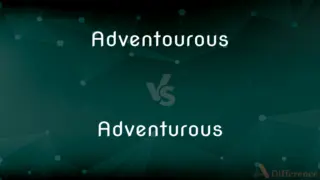
Previous Comparison
Adventourous vs. Adventurous
Next Comparison
Begginer vs. BeginnerAuthor Spotlight
Written by
Tayyaba RehmanTayyaba Rehman is a distinguished writer, currently serving as a primary contributor to askdifference.com. As a researcher in semantics and etymology, Tayyaba's passion for the complexity of languages and their distinctions has found a perfect home on the platform. Tayyaba delves into the intricacies of language, distinguishing between commonly confused words and phrases, thereby providing clarity for readers worldwide.

